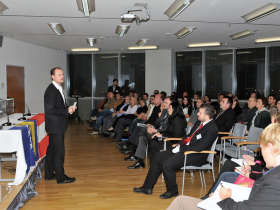Kopfstand09: Bosnia and Herzegovina on its way to the EU

A country with a complex internal structure was at the centre of a Kopfstand09 event at the Wissensturm on 23 September, which provided information as well as the stage for a discussion on Bosnia and Herzegovina, in particular in regard to its rapprochement to the EU.
Samir Rizvo, chairman of the working group of Bosnia and Herzegovina’s Council of Ministers and in charge of the dialogue with the European Union on a liberalization of the visa regime, described the situation in his country. Rapprochement to the EU is slow and laborious. Bosnia and Herzegovina has to meet a total of 43 requirements, which is not exactly made easier by the country’s complex constitution resulting from the Dayton Accord, as Rizvo pointed out. The rigid immigration conditions formulated by the EU and especially by Austria that have to be met by Bosnian and Herzegovinian nationals caused many people in the audience to shake their heads in disbelief.Austria’s restrictive visa policy
Even though Austria was among the first states to recognize Bosnia and Herzegovina as an independent state, the republic is notorious for its visa policy which is strict to the point of chicanerie. According to Rizvo, “it is much simpler and quicker to obtain a visa for Germany or France than it is for Austria”. This obviously hampers contacts between the two countries enormously and affects in particular work in cultural fields; scientists, business people and politicians suffer as well. What is particularly worrisome is the fact that Austria is the biggest investor in Bosnia and Herzegovina, with around 300 businesses active in the country, which, incidentally, boasts the highest growth rate in the region as a market.
The bilingual discussion evening was organised by Linz09 in cooperation with ZZI – Zentrum der zeitgemäßen Initiativen (Centre for timely initiatives) and supported by the Bosnian Ministries of Defence and Foreign Affairs and Bosnia and Herzegovina’s embassy in Vienna.





